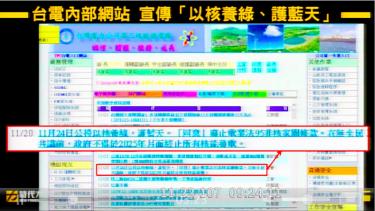An internal Web site of state-run Taiwan Power Co (Taipower, 台電) has posted a notice urging employees to support a referendum to cancel a government policy to phase out nuclear power, apparently breaching laws on government neutrality, New Power Party Executive Chairman Huang Kuo-chang (黃國昌) said yesterday.
In a question-and-answer session at a meeting of the Legislative Yuan’s Judiciary and Organic Laws and Statutes Committee, Vice Minister of Civil Service Tsai Hsiu-chuan (蔡秀涓) confirmed that such posts should be illegal and said that she would look into the matter.
Huang said the post, which was on an employees-only Web site of the Ma-anshan Nuclear Power Plant in Ma-anshan (馬鞍山), Pingtung County, was entitled: “The Nov. 24 referendum to keep nuclear power, allowing the nation to develop clean energy and keeping the sky clear.”
The referendum, one of 10 to be held tomorrow alongside the nine-in-one local elections, asks voters whether they agree to scrap Article 95, Paragraph 1 of the Electricity Act (電業法), which stipulates that all nuclear power plants in the nation must cease operations by 2025.
“Agree to scrap the ‘nuclear-power free homeland’ clause in Article 95 of the Electricity Act. The government should not shut down all nuclear power plants by 2025 before members of the public reach a consensus on the matter,” read a screenshot of the post provided by Huang.
According to Article 10 of the Civil Service Administrative Neutrality Act (公務人員行政中立法), civil servants cannot use any power, means or opportunity obtained through their position to ask people to vote in a certain way or to not vote in elections or referendums, Huang said.
“Is it legal to make a post on a Web site saying who should be voted Taipei mayor or New Taipei City mayor? The answer is, of course, no. Is that not the same with referendums?” he said, adding that the Web site is a public resource.
Tsai initially said that she was unfamiliar with related laws, but later agreed that such posts should be illegal, adding that she would have to look into the details.
Following the meeting, Taipower said that the post was made by union members and that it had already been removed.
Taipower respects every employee’s opinions on the referendum, but posting them on company Web sites is “inappropriate,” company spokesman Hsu Tsao-hua (徐造華) said.
Taipower has 27,000 employees and many different unions, he said, adding that the post was made by a union related to nuclear energy departments and does not represent the company’s view.
Taipower has enhanced employee education to ensure that they follow principles of administrative neutrality and refrain from promoting or discussing referendums on public platforms, he added.
Source: Taipei Times - 2018/11/23





















